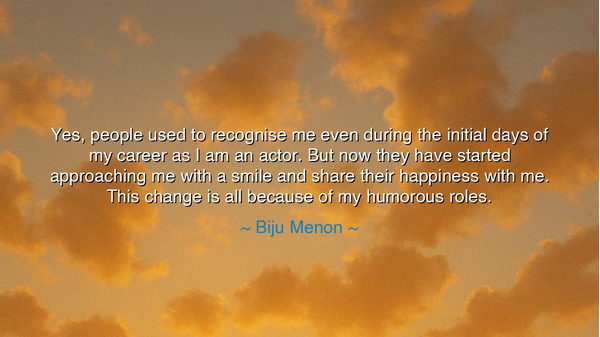
Yes, people used to recognise me even during the initial days of
Yes, people used to recognise me even during the initial days of my career as I am an actor. But now they have started approaching me with a smile and share their happiness with me. This change is all because of my humorous roles.






Hear now the words of Biju Menon, a man of the stage and screen, who spoke thus: “Yes, people used to recognise me even during the initial days of my career as I am an actor. But now they have started approaching me with a smile and share their happiness with me. This change is all because of my humorous roles.” Though simple in form, these words contain a treasure of wisdom, for they reveal that the highest calling of art is not merely to be seen, but to be remembered with joy.
In the beginning of his journey, Menon was recognized for his craft and his presence, as any actor is. Recognition is the first fruit of fame: a face known, a name spoken. But recognition alone does not bind the hearts of people. It is fleeting, like the applause that fades once the curtain falls. What he later discovered is far greater: that through the gift of humor, he could kindle warmth in others, drawing not only their attention but also their affection. For when a man makes others smile, he writes his name not on their minds alone, but on their hearts.
This is no small transformation. To be famous is to be noticed; to bring happiness is to be loved. And love endures beyond fame. The ancients knew this truth well. Consider the tale of the fool in the courts of kings, whose jests and lighthearted words softened the tempers of rulers and eased the burdens of their subjects. Though he held no crown, he carried the power to lift spirits in times of war and famine. His legacy, though often unrecorded, lived in the laughter of the people. So too with Menon’s words: they remind us that greatness in art is not merely mastery, but the ability to give light in the midst of heaviness.
Think also of Charlie Chaplin, whose silent performances in a world torn by war and hardship made millions forget their sorrow, if only for a moment. Chaplin was not adored because he was merely recognized as an actor; he was cherished because he gave laughter to those drowning in despair. His gift was not just talent, but the power to transform grief into joy. In the same way, Menon’s discovery—that his humorous roles brought people closer to him—unveils the eternal truth that joy is the bridge between souls.
The meaning, then, is this: true success is not measured by recognition, but by the smiles you awaken in others. Titles fade, applause dies, and even fame may wither in time, but the memory of those who bring happiness endures through generations. For it is not the sharpness of wit alone that matters, but the generosity of spirit—the willingness to give joy as one gives water to the thirsty.
Thus the lesson: in whatever work you do, seek not only to be acknowledged, but to be remembered with warmth. Whether in art, labor, or daily living, strive to be one who leaves behind smiles, not only signatures; joy, not only recognition. Ask yourself: Does my presence lighten the burdens of those around me? Do I sow laughter where sorrow lingers? For this is the measure of true impact.
Therefore, my children, practice this wisdom in your days: let your words be touched with kindness, let your actions be seasoned with joy, and when possible, bring laughter into darkened places. Do not chase only the recognition of men, for that is like smoke in the wind. Chase instead the gift of leaving behind happiness, for in that lies a legacy stronger than stone. As Menon discovered, the world will not only see you—they will approach you with open hearts, carrying your joy as their own.






AAdministratorAdministrator
Welcome, honored guests. Please leave a comment, we will respond soon